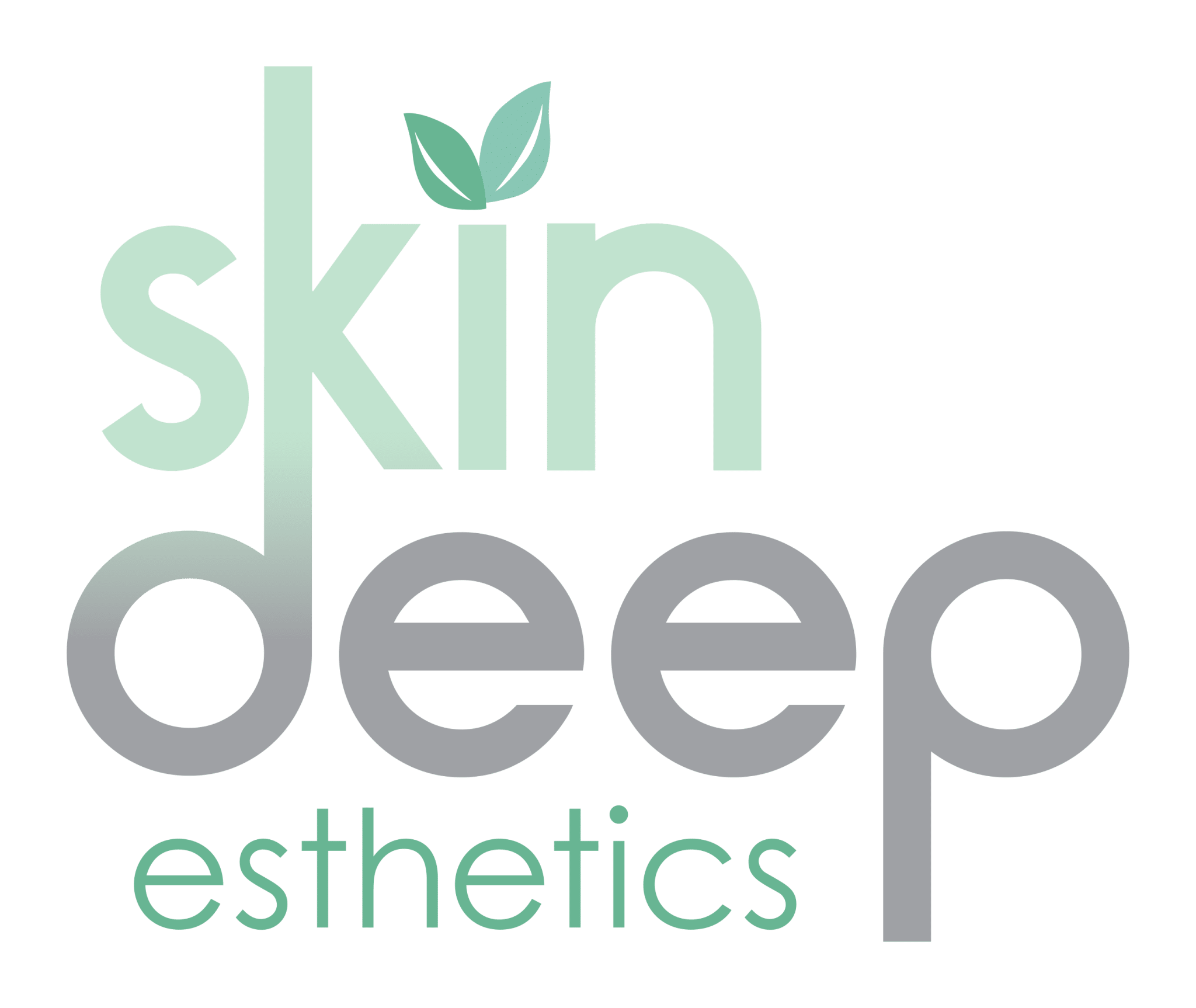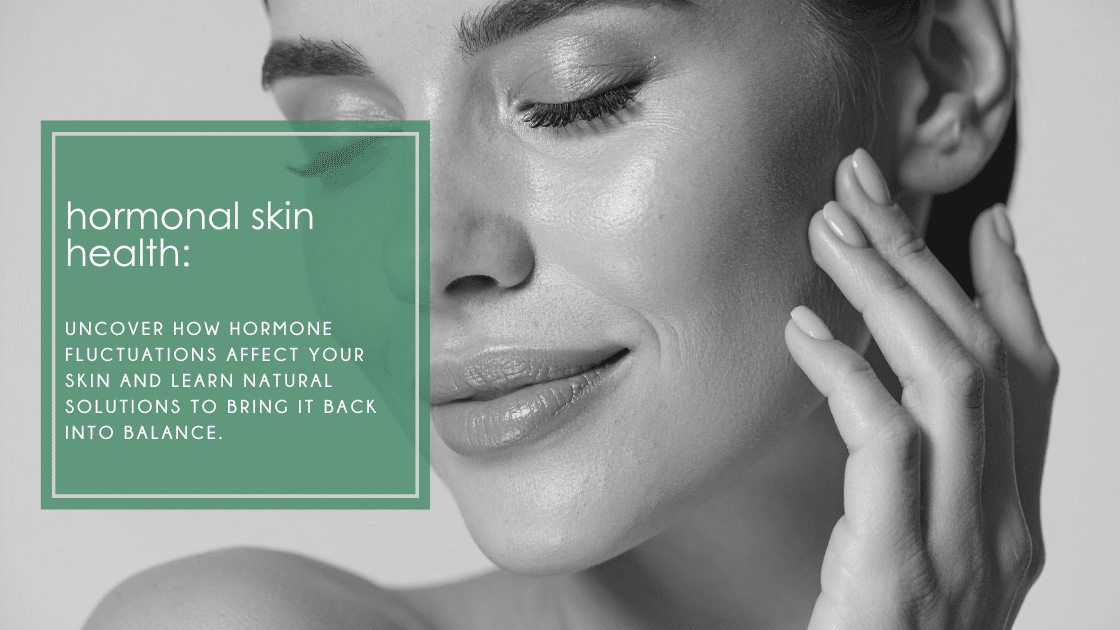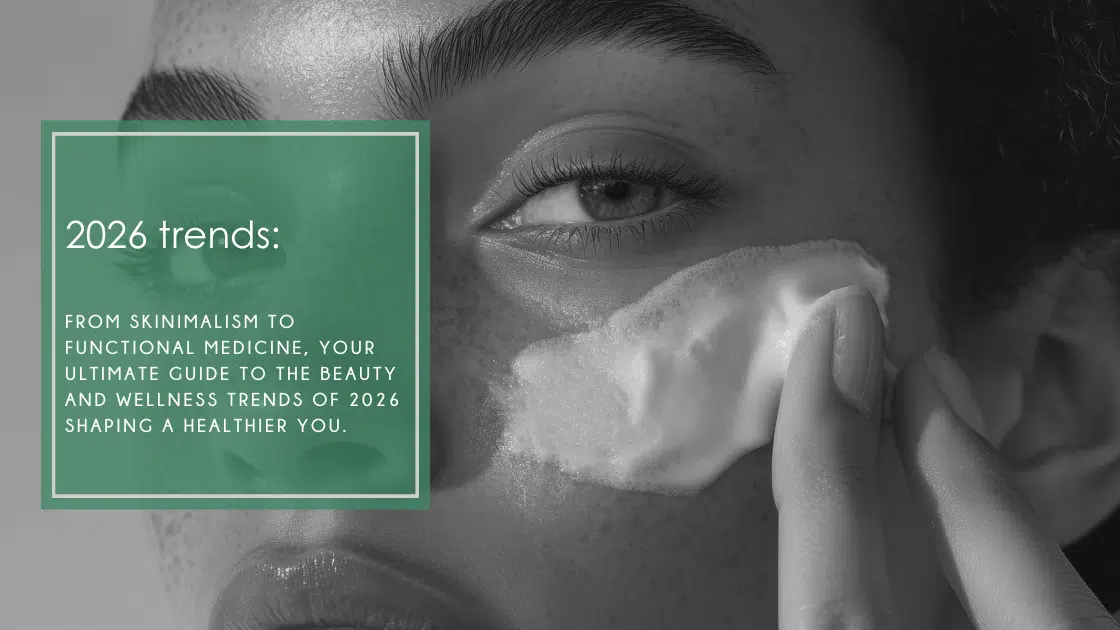Hormones and Skin Health
Why Might Our Hormones Be the Real Reason Behind Skin Issues?
Hormones play a huge role in overall skin health. Recognizing hormonal imbalances and shifting to a holistic skincare approach, rather than masking symptoms with harsh products, is the key to true skin transformation. In today’s blog, we’ll explore how hormones affect your skin and what you can do to restore balance, naturally.
How Do Hormones Affect Your Skin Health?
When hormones fluctuate, they can send your oil glands into overdrive. Elevated androgens and testosterone trigger excess oil production, leading to breakouts, clogged pores, and even unwanted hair growth on the chin or jawline. According to PubMed, “Estrogens inhibit the secretion of androgens, modulate genes involved in the growth of the sebaceous gland, and inhibit their function. The activity of the sebaceous gland, therefore, depends on the estrogen/androgen ratio.” This means that your skin’s oil production is directly tied to your estrogen-to-androgen ratio, a delicate balance that defines how your skin behaves.
How Do I Know If I Have Hormonal Acne?
Hormonal acne typically tends to follow a cyclical pattern, meaning it comes and goes depending on your menstrual cycle. This type of acne tends to appear on the jawline, neck, and chin area. If your breakouts are deep, painful cysts on your chin and jawline, you are likely experiencing hormonal acne.
Hormone Changes
Hormonal changes occur when there are fluctuations in the body and act as chemical messengers that influence metabolism, mood, and reproduction. When they change, you may experience symptoms such as mood changes, irregular periods, hair growth or loss, acne, weight gain, hot flashes or night sweats, and fatigue. Below are common stages of hormonal shifts.
Puberty
During puberty, the pituitary gland begins to release reproductive hormones that increase oil production. This is when teens begin to change, and one of the most common issues during puberty is acne. The oil glands become stimulated and tend to overproduce oil, resulting in blackheads and acne because dirt and oil get trapped in the pores. When androgens become active, they stimulate excess oil production. Proper cleansing and gentle exfoliation during this stage can help manage breakouts and support long-term skin health.
Pregnancy
Pregnancy brings major hormonal fluctuations, often causing acne or melasma (dark patches). The good news? These issues typically resolve after birth as hormone levels normalize.
Polycystic Ovarian Syndrome
Polycystic Ovarian Syndrome (PCOS) affects mostly women of reproductive age. PCOS affects 5–10% of women and is one of the most common endocrine disorders. It affects how insulin is processed, which puts women at risk for weight gain, infertility, diabetes, cardiovascular disease, and mood disorders. PubMed states, “The pathophysiology of PCOS is complex and multifactorial, with aberrancies in ovarian steroidogenesis, insulin resistance, antimullerian hormone (AMH), and Luteinizing hormone (LH) excess from dysfunction of the hypothalamic-pituitary-ovarian (HPO) axis. These pathways interact in numerous ways and at various points along the pathogenic chain. However, most recent literature has increasingly recognized it as a metabolic disease. The bidirectional link between hyperinsulinemia and androgen excess is an essential pathogenetic feature.”
How Does PCOS Affect Skin Health?
Women with PCOS often struggle with:
- Acne: Triggered by androgen-driven oil production.
- Post-Acne Hyperpigmentation: Poor insulin regulation can cause dark patches as acne heals. It can also leave dark patches in the armpits, elbows, and groin areas.
- Facial Hair Growth: Excess androgens stimulate thick, dark hair on the chin and jawline, often leading to ingrown hairs or folliculitis.
Thyroid
Many confuse the thyroid as a hormone. The thyroid gland produces hormones that regulate metabolism, body temperature, heart rate, and growth/development. When it’s imbalanced, it can cause dry, flaky skin, itching, rashes, or even eczema-like breakouts. Supporting thyroid function with balanced nutrition and stress management can make a visible difference in skin texture and tone.
Perimenopause vs. Menopause
The symptoms of perimenopause and menopause are similar because symptoms can carry over. However, most of the hormonal changes start during perimenopause.
Perimenopause
Perimenopause is the transitional period before menopause that can last from a few months up to 10 years and ends when a woman has not had her period for a consecutive 12 months, which is when menopause begins. As estrogen and progesterone levels decline, women often notice acne, dryness, fine lines, and increased skin sensitivity. During perimenopause, women begin to notice changes in the way their skin looks, acts, and responds. Some typical changes are dry skin, acne, wrinkles, sagging skin, hyperpigmentation, increased sensitivity, and thinning skin.
What Happens to Your Skin In Perimenopause
In this transition period, many women may develop painful acne, mainly in the jaw and mouth areas, caused by an imbalance of the hormones, androgens increasing and estrogens decreasing. According to PubMed, “In menopausal women, mechanisms that lead to new onset or recurrence of acne are unclear; however, hormonal factors, specifically androgens, play a major role. This hormonal imbalance between estrogen and androgen further increases due to decrease in sex hormone-binding globulin (SHBG) levels and is called postmenopausal hyperandrogenism, which can lead to acne flare.”
Menopause
Menopause is the period when menstruation completely stops, due to a decline in estrogen and progesterone levels, the natural biological occurrence that ends a woman’s reproductive life. Aside from the emotional and physical changes that occur, this is when women notice a change in their skin.
What Happens to Your Skin In Menopause
Collagen Loss
Menopause affects both the functionality and structure of the skin. Symptoms such as dry skin, collagen loss, thinning of the skin, lack of elasticity, wrinkles, and hyperpigmentation. The primary reason is that once estrogen & progesterone decline, collagen loss increases. According to PubMed, “A rapid decline in skin collagen is seen following menopause, with nearly a third lost in the first 5 years and a decline of 2.1% per year over the 15 years following menopause.”
Elastin Degradation
As if that’s not bad enough, the elastin also degrades. PubMed states, “Elastin degeneration increases with menopause and manifests clinically as slack skin and increased wrinkling.” Elastin is like a rubber band. Picture a worn out rubber band, this is what happens to the skin after menopause.
Increased Redness or Flushing
Another common skin concern is the increase in redness or flushing in the skin. Many women may think their skin has become sensitive because it flushes more easily; however, this is due to the thinning of the skin, making the capillaries more noticeable.
Does Your Skin Age Faster?
Yes. Within the first 5 years of menopause, you lose 30% of collagen. After 5 years, you lose about 1-2% a year.
A Better Solution for Hormones
Let’s shift gears and talk about hormone testing. I can’t tell you how many clients have come in feeling off or having hormonal symptoms. They go to their doctor to test their hormones but they come back normal. And are then told to come back when the symptoms get worse. WHAT? That’s because traditional blood tests capture a single moment in time. Isn’t there a better solution? There is! As a student of Functional Medicine, we are now able to do extensive hormone testing to map out your entire cycle, imbalances, and when in your cycle the imbalance occurs.
The DUTCH Test for Hormones and Skin Health
Our favorite test to run is called The DUTCH (Dried Urine Test for Comprehensive Hormones) Test, a full hormone panel that you do at home. It starts at the beginning of your cycle and you test through the beginning of your second cycle. The results will map out your cycle, show imbalances and where imbalances occur, plus check cortisol, vitamins and minerals, and inflammatory markers. This is the answer that women are looking for! The reason your doctor often doesn’t pick up a hormonal imbalance is that a blood test is a snapshot of your hormones on the day of testing. The DUTCH Test maps out your cycle so you can identify your imbalances, giving you the complete picture. This can help you manage perimenopause and menopause much more easily.
How To Treat Your Skin During Changes in Hormones?
Keep it simple to ensure your skin stays healthy and hydrated. The first thing is to avoid any harsh cleansers or exfoliants because these increase dryness by damaging the skin barrier. Try this instead…
Cleanser: Twice daily, use a cream or oil cleanser twice daily
Exfoliation: Once a week, use a gentle gommage to stimulate cell turnover.
Serums: Layer serums both morning and night. Start with a hyaluronic serum twice a day. Layer over the hyaluronic acid either retinol or bakuchiol serum every night, and a peptide serum every morning. If dark spots are your main concern, Vitamin C added to your morning routine because it’s an antioxidant, which brightens dark spots. If you have active breakouts, we love this acne serum to spot-treat stubborn breakouts.
Moisturizer: A ceramide-rich moisturizer holds water in the skin.
Facial Oils: Face oils can increase hydration or decrease oiliness because they normalize oil production. You can mix it with your moisturizer or apply it underneath your moisturizer. This is our favorite oil for fighting acne and one oil for increasing skin hydration.
Protect: Always wear a zinc-based sunscreen to protect delicate skin from sun damage.
Facial Treatments
Facials are great for skin health. Monthly facials will maintain a healthy skin barrier, minimize dryness, fight acne breakouts, and increase cell turnover.
Ready to Get Started?
We would love to help you with your skin during this time. Please visit our website to book your first appointment today or to shop for skincare products. Got questions? Please drop them in the comments below.



